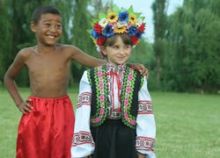On November 16 the world marked the International Day for Tolerance. One of the ways tolerance can be manifested is favorable treatment of ethnic minorities. This issue is very relevant for Ukraine, because more and more violations are being registered by various human rights organizations. Thus, according to the statistics provided by the Ministry of Internal Affairs, in the past five years the number of crimes against aliens has nearly doubled, from 600 to over 1,000 cases. The Institute of Sociology at Ukraine’s National Academy of Sciences has already reported that over 60 percent of Ukrainians regard the ethnic situation in this country as tense and even fraught with conflict.
In order to find out how Ukrainian children treat their non-Ukrainian peers, the Open Politics Foundation, supported by the Swiss Embassy in Ukraine, conducted its first sociological research called “The rights of children in ethnic minorities in Ukraine: problems and prospects.” A detailed account of its results was offered to The Day by Alla ZINCHENKO, Ph.D. in History, expert with the Open Politics Foundation.
Ms. Zinchenko, what was the purpose of this research and what is its major outcome?
“In the course of this pilot research, we interviewed 300 schoolchildren in Kyiv to identify cases when children’s rights were violated. The target audience consisted of 150 ethnic Ukrainian and the same number of Russian, Belarusian, Georgian, Vietnamese, Azerbaijani, and other national children. The poll also comprised a group of experts: teachers, psychologists, and NGO representatives.
“The children’s main problem now is that they are discriminated against, both in the street and at school. They often hear inimical remarks concerning their national identity from their peers, adult strangers, and sometimes even teachers. We have also analyzed the level of their integration into Ukrainian society. The results of the poll show that 65 percent of ethnic minority children identify themselves as Ukrainian citizens. They can speak mostly either Ukrainian or Russian, i.e., language integration is under way. Over 60 percent children said they share the culture, customs, and traditions of Ukraine.
“We also asked the experts to assess the degree to which the ethnic minority children’s rights are secured. The highest grade (with a maximum of 10 points) was assigned to several rights: enjoying national culture, observing national rituals, using their mother tongue, living together with parents, education, and free schooling.
“Five to six points were given to the right to protection against violence and abuse, the right to special care due to special needs, and the right to social security. When we asked the experts which factors are crucial in securing these rights, they unanimously pointed to the status and position of parents. If parents are Ukrainian citizens, all their children can enjoy these rights. If, however, they are refugees seeking political or other shelter, everything depends on their material well-being, their acquaintance with their rights and mechanisms through which they can be ensured, for example, the right to welfare. Ukrainian legislation on children’s rights also has a considerable impact. There are perfect laws in this country concerning children’s rights, but in practice a good deal of them are not enforced. On average, the experts estimated the level of ensuring minority children’s rights at 7.5 points.”
On the whole, can one speak of a tolerant attitude to ethnic minority children on the part of their Ukrainian peers?
“Basically, yes, because there are no incidents among peers and friends. However, this area requires a more detailed analysis. We were more interested in the attitudes of children rather than adults, because the processes of globalization will cause Ukraine’s borders to open more widely to intensive migration flows. Our nation will not stay aside or block this process, so Ukrainian children must be ready to find more and more non-Ukrainian nationals living next door.
“The results of the poll suggest that finding a common language comes to children easier than to adults. We asked them how they felt towards individuals with a different skin color, religious denomination, etc. Most children (69 percent) answered that they could be friends; less than one percent said that they treated aliens with suspicion. That is to say, children are more tolerant in this respect than adults; they are more open.
“We also asked children if they had friends whose ethnic identity was different from theirs, and 85 percent Ukrainians and 90 percent ethnic minority children replied in the affirmative. When asked how important the national identity of their friends was, 85 percent of the Ukrainians and 70 percent of other nationals replied that it did not matter. That is, to them national identity is irrelevant; such things as communication and friendship come first.”
What should be changed on the state level, or in the Ukrainian mentality, to preserve such tolerance in children and spread it to entire society?
“It is necessary to foster more tolerance among our citizens, which requires a totally different level of teacher training, in particular, the introduction of new courses and professional development. Models of tolerant behavior should be introduced via educational campaigns among Ukrainian parents and children on the one hand and ethnic minorities, on the other. These campaigns should demonstrate the other nations’ achievements and cultural traditions. NGOs should also change their activities concerning the realization of social integration programs for refugees and asylum seekers, because their integration-related problems are caused by insufficient language competence and ignorance regarding their rights and Ukrainian legislation.
“Our legislation should also be modified, in particular, in order to simplify the procedure for obtaining the refugee status. Its absence blocks individuals’ access to social security, which is otherwise available in Ukraine. On the basis of the results yielded by this poll we are going to develop a set of recommendations for a nationwide poll, which will be more representative and will enable us to draw more fundamental conclusions.”







